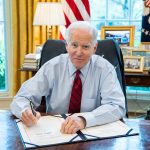In an unexpected twist, President Joe Biden decided to hang up his campaign boots for a second term, leaving behind a political game of musical chairs that’s now centered on Vice President Kamala Harris. Almost immediately, Biden threw his support behind Harris, endorsing her as the presumptive nominee for the Democratic Party. One might think that would make for a smooth transition, but in the world of Democratic politics, nothing ever really comes easy—or simply.
Despite Biden’s stamp of approval, many big names in the Democratic realm have chosen to play coy, refraining from jumping on the Harris bandwagon. Instead of lining up to kiss the ring, some heavyweight Democrats have their own ambitions, creating a situation where Harris’s path to the nomination is anything but paved. With other prominent Democratic figures eyeing a potential run, the speculation is running rampant, suggesting that Harris might have to stretch her political legs and fend off a multitude of challengers in what could become a spectacle worthy of a soap opera finale.
New logo and first press release from Harris for President — a roundup of endorsements from elected officials. The first listed is NC Gov. Roy Cooper. pic.twitter.com/TAgdk72KOe
— Dylan Wells (@dylanewells) July 22, 2024
On the surface, Harris might be the frontrunner, with her campaign already boasting some initial delegate support that could make her nomination a walk in the park come convention time in August. However, lurking in the shadows are a dozen or so high-profile Democrats who have not endorsed her, with names like California’s Gavin Newsom, Michigan’s Gretchen Whitmer, and various other governors and senators leading the charge. While some may eventually throw their hats into the ring just to help her out, others are content to watch from the sidelines, clearly weighing their own chances.
Adding a bit of spice to this unfolding drama is the absence of one significant endorsement: Barack Obama. Although he penned a piece lauding Biden’s political legacy, he conspicuously omitted any mention of Harris, leading many to speculate whether his silence signifies a lack of faith in her ability to rally the Democratic troops. His vague assurance that “outstanding nominees” will emerge does nothing to quench the curiosity about whether he genuinely backs his former Vice President, or if he’s secretly hoping for a different candidate to emerge from the fog.
The delay in endorsements doesn’t stop at Obama, either. Key Democratic figures, including Senate Majority Leader Chuck Schumer and House Minority Leader Hakeem Jeffries, are playing a calculated game. It appears these party stalwarts are reluctant to be seen as steering the ship—too many ties to Biden’s withdrawal could make them look like puppeteers, tugging on strings behind the scenes. Perhaps they fear that such a perception would color public perception of Harris as merely a placeholder rather than a leader.
Although Harris appears to be gaining momentum, the unfolding landscape shows a fractured party behind the scenes—one that has yet to fully embrace her as their next champion. With so many uncertainties and potential challenges ahead, the coming months could reveal a great deal about the Democratic Party’s future leadership and its ability to rally around their new chosen one, assuming they can ever settle on who that should be. All eyes will be on how the Democratic electorate reacts, especially after being assured for so long that everything was under control with Biden at the helm.




